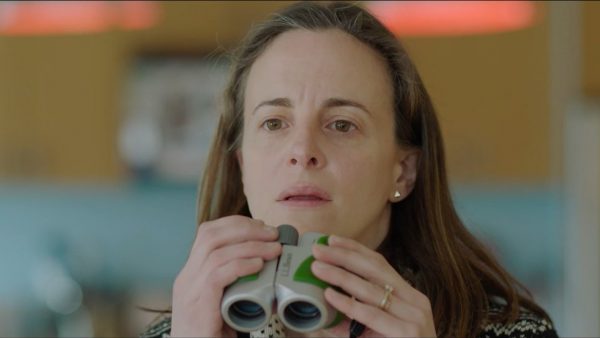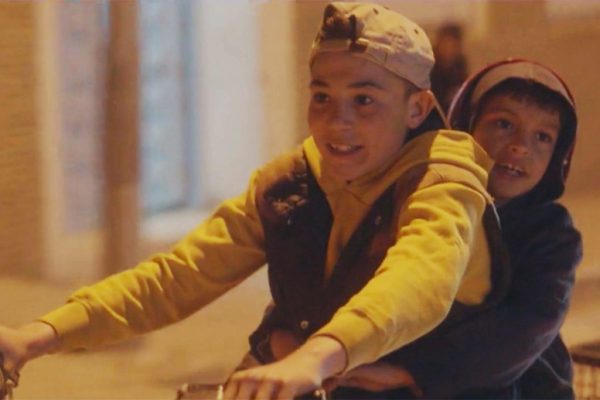Film Review: 2020 Oscar-Nominated Short Films — No More Than Adequate
By Gerald Peary
Who can explain why two of the five nominees are set in Tunisia? Or why several of them seem like student films?

A scene from “The Neighbor’s Window.”
It’s hardly credible that here’s the best that the Academy could come up with: five adequate, not particularly remarkable shorts from around the world competing for the 2020 Live-Action Shorts Oscar. Who can explain why two of the five are set in Tunisia? Or why several of them seem like student films? The nominees are being screened at Boston’s Institute of Contemporary Art from January 30 to February 1. They can also be seen at Kendall Square Cinema starting January 31 and at Coolidge Corner Theatre from January 31 to February 6.
Donald Trump must adore me: I acknowledge that the superior entry among the five is the American one, “The Neighbor’s Window,” a riff on the voyeurism of Alfred Hitchcock’s Rear Window. It’s a switch to fiction by veteran documentarian Marshall Curry (Street Fight), who last year was nominated for Best Documentary Short with “A Night at the Garden.” So what’s the current one about? A Brooklyn couple look out of their apartment picture window and see the new neighbors across the way brazenly having sex, apparently not caring that they can be observed. Or are they getting off being seen in the raw? Our Brooklyn couple are scandalized, and yet they can’t stop looking. The film jumps ahead in time, and the couple have bought binoculars. It’s the wife (beautifully played by Maria Dizzia) who rails against their exhibitionist neighbors, but she’s the one who secretly peeks the most.
“The Neighbor’s Window” deepens when the wife, strapped by the demands of a new baby and two older children, finds herself jealous of those she’s been staring at. Not only do they have steamy sex but they have hot parties. It looks like so much fun across the way. Meanwhile, the wife and husband argue about who is carrying the weight in the marriage, and both are stressed and anxious. But then the movie shifts, and perhaps in a too dramatic way. The beautiful party people have tragedy come into their lives, precipitating an unlikely meeting of the two women. A very good short film deflates with an ending too loaded with Meaning.
“A Sister,” Delphine Gerard’s French-language short from Belgium, is a competently made mini-thriller about a young woman kidnapped in a car. She calls a police dispatcher and tries to throw out clues about how to rescue her, all the time sitting next to her kidnapper. How does she get away with it? Pretty improbably, by pretending she is talking to her sister. More improbability: the daft kidnapper somehow never hears the other side of the extended phone conversation, even though it’s happening two feet away from him. Nevertheless, the tension of the scene is maintained, adding in, as a third party on screen, a shrewd woman dispatcher. “A Sister” absorbingly cuts among the three characters, though the kidnapper has no identity beyond being a one-dimensional psycho.
In Meryam Joobeur’s “Brotherhood,” a patriarchal Tunisian sheep farmer, who lords over his wife and their ginger-haired sons, is taken aback when his third son, the oldest, suddenly returns home with a wife. The son left home to fight in Syria with Isis. The bride he brings back is covered in a hijab from head to toe. The father vehemently disapproves of everything about this son: his allegiance to Isis, and this strange marriage. But there is more to the son’s life than what seems on the surface. The father learns this, but, alas, too late. The story of “Brotherhood” is better than the sometimes clumsy shooting and editing and the stiff acting of a clearly amateur cast.

A scene from “Nefta Football Club.”
Yves Piat’s “Nefta Football Club” is a farcical tale about what happens when a mule transporting bags of heroin runs away from some foppish drug dealers and is discovered by two Tunisian brothers on the Algerian border of their country. The brothers bring the donkey back to their home town. The older brother conceals the heroin, realizing what it is. The younger brother thinks its laundry detergent, a mix-up leading to a fairly amusing conclusion on a soccer field: thus the title of this slight, mildly diverting movie.
Bryan Buckley’s “Saria” is a dramatized recreation of a true-life tragedy which took place in a girl’s orphanage in Guatemala. It’s a dreadful, suffocating imprisonment where the girls are routinely addressed as “bitches” by the staff, where a girl protagonist is removed from a classroom by the teacher pulling her by her hair. The girls break out of this orphanage, and with a crazy plan to walk to America. But they are captured quickly by Guatemala’s thug military police. And then the tragedy: infamous in Guatemala, unknown to the outside world.
What will win the Oscar? Either the American short, because it’s professionally done and it’s American, or the Guatemalan one because the story is the most monumental of the five films. Also, the socially-conscious filmmaker of “Saria” is an American, a highly successful one, who has directed 63 Super Bowl commercials.
Gerald Peary is a Professor Emeritus at Suffolk University, Boston, curator of the Boston University Cinematheque, and the general editor of the “Conversations with Filmmakers” series from the University Press of Mississippi. A critic for the late Boston Phoenix, he is the author of nine books on cinema, writer-director of the documentaries For the Love of Movies: the Story of American Film Criticism and Archie’s Betty, and a featured actor in the 2013 independent narrative Computer Chess. His new feature documentary, The Rabbi Goes West, co-directed by Amy Geller, is playing at film festivals around the world.
Tagged: 2020 Oscar-Nominated Short Films, A Sister, Bryan Buckley, Meryam Joobeur, Nefta Football Club, Saria, The Neighbor’s Window
